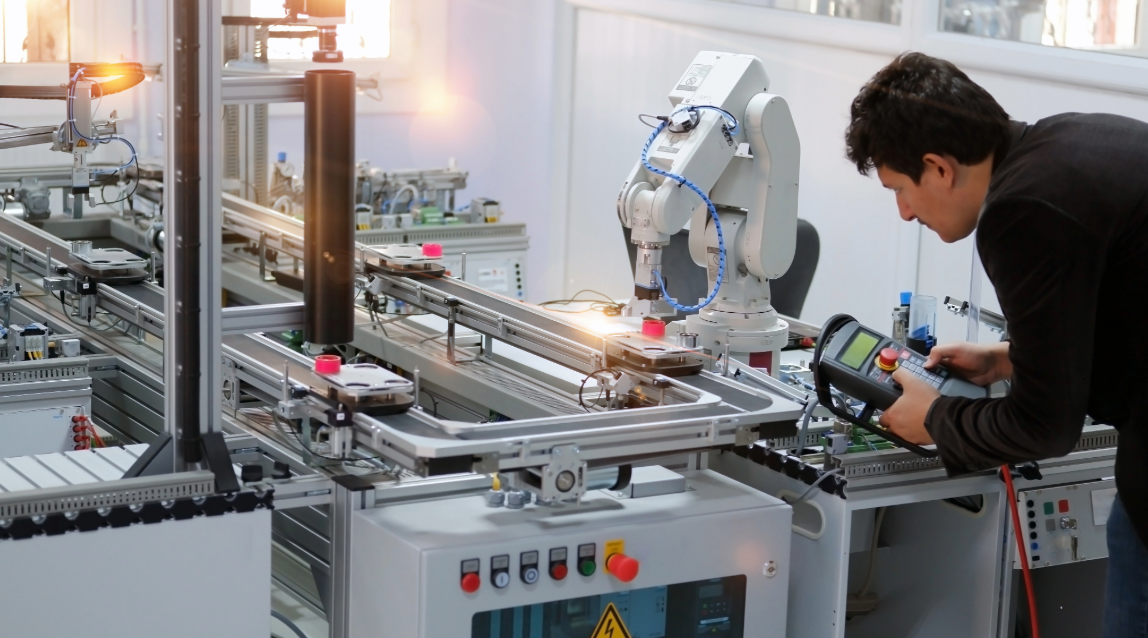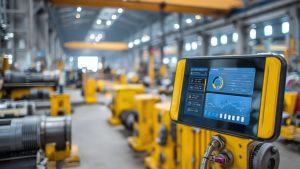The manufacturing world is changing rapidly. To stay ahead, businesses need to embrace future-proof manufacturing with advanced tech solutions. This isn’t about following the latest trend; it’s about using technology to build a resilient and adaptable business. Can your operation handle sudden changes in customer demand or fluctuating supply chains?
To remain competitive in the future of manufacturing, companies should strive for enhanced operational excellence and uncover innovative paths to profitability. They also need to adopt technologies to mitigate the risks of post-pandemic economic effects.
Future-Proof Manufacturing with Advanced Tech Solutions
Table Of Contents:
- Future-Proof Manufacturing with Advanced Tech Solutions
- Leveraging Tech for a Future-Proof Manufacturing Business
- Building a Future-Proof Strategy
- Conclusion
Leveraging Tech for a Future-Proof Manufacturing Business

Let’s explore some game-changing tech solutions that are transforming manufacturing. Did you know that research from Gartner, Inc found that 82% of CEOs in supply chain-intensive industries plan to increase investments in digital capabilities across their enterprises? However, only 32% align their digital supply chain strategies under a single governance process with shared business goals.
AI and Machine Learning: The Brains Behind the Operation
Artificial intelligence (AI) and machine learning (ML) are powerful tools that can make manufacturing smarter and more efficient. They can be used for predictive maintenance, which analyzes data from sensors to identify patterns that indicate potential equipment failures.
This proactive approach translates into less downtime, reduced maintenance costs, and optimized performance. AI and ML’s impact extends far beyond maintenance, offering data insights that can transform various aspects of manufacturing operations.
The Rise of the Robots (and Why That’s a Good Thing)
While some fear robots will take over, in manufacturing, they are becoming valuable team players. According to a Deloitte study, “autonomous robots can improve the speed and efficiency of routine operations.” This is particularly true in warehousing and manufacturing spaces.
Robots can work alongside humans for added efficiency and reduce the risk of employee injury in dangerous environments. They handle repetitive, potentially dangerous tasks, allowing human workers to focus on problem-solving and critical thinking.
This blend of human skill and robot efficiency, sometimes referred to as Industry 5.0, creates a safer and more productive work environment.
Building a Smarter Factory with IIoT
The Industrial Internet of Things (IIoT) connects machines, systems, and people, gathering and analyzing data in real-time. IIoT has already begun revolutionizing industries, with automotive OEMs, in particular, having been plugged into Industry 4.0 for some time.
IIoT enables improved decision-making, reduced waste, and more streamlined production processes in manufacturing facilities. Implementing emerging technologies like IIoT allows businesses to create opportunities for growth and innovation.
Now that we’ve discussed the technologies that can help future-proof manufacturing operations, let’s explore strategies for successful integration and adoption.
Building a Future-Proof Strategy

Investing in tech is only half the battle. The real key is to build a solid strategy for integration and adoption.
1. It All Starts with Data
Data analysis is crucial for success. By effectively using data collected from operations, manufacturers can improve efficiency, make better decisions, and even uncover new opportunities. This data-driven decision-making process is essential for staying ahead in a rapidly evolving business landscape.
2. A Culture of Continuous Learning
To succeed in manufacturing long-term, you need to embrace a culture of continuous learning and improvement. This means providing training programs to upskill your workforce, ensuring they can keep up with rapid technological advances and leverage them effectively.
Fostering a learning environment enables employees to adapt to new technologies and processes, making the organization more agile and responsive to market demands.
3. Collaborate to Win
In an interconnected world, collaboration is key to unlocking growth. Staying connected with industry peers is essential for keeping up with new tech and emerging trends. It also provides support for overcoming industry-specific challenges.
Collaboration can foster innovation and lead to the development of new solutions by bringing together different perspectives and expertise.
Conclusion
Future-proofing manufacturing with advanced tech solutions is not a one-size-fits-all approach; it’s about finding the right solutions that align with a company’s specific needs and goals. To embrace these transformative solutions, businesses should start by fostering a company culture ready to adapt. They also need to be willing to invest in their employees and embrace the power of collaboration.
Remember that future-proof manufacturing with advanced tech solutions is a journey, not a destination. Continuous learning is key to staying ahead in a constantly evolving manufacturing landscape. The successful integration of innovative technologies will pave the way for a more resilient and competitive future.
Expanding on this, smart manufacturing plays a crucial role in helping businesses stay ahead. By incorporating advanced technologies such as cloud computing, businesses can enhance data management, ensuring they make well-informed decisions faster. These digital tools also contribute to a seamless digital transformation, allowing companies to optimize their operations and remain agile in the face of change.
To truly thrive in the modern manufacturing landscape, businesses should also leverage AI. Artificial intelligence can drive efficiency and productivity, automating complex processes and reducing human error. Embracing these tech-driven strategies is essential for those looking to future-proof their manufacturing operations and secure long-term growth.



